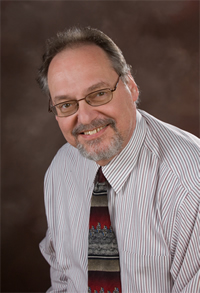FAYETTEVILLE, Ark. – The fall’s first speaker in an education reform lecture series at the University of Arkansas will address whether money spent on school buildings tends to affect student achievement. Locally, the topic is particularly timely as Fayetteville voters consider a millage proposal to raise funds for the construction of a new high school. With the recent release of federal stimulus money to help schools, though, the question has national ramifications, too.
Steven A. Peterson, a professor of politics and public affairs at Pennsylvania State University-Harrisburg, will speak at noon Friday, Aug. 28, on “Building Construction Expenditures and Student Performance.” The lecture is free and open to the public. Reservations are requested for a light lunch served with the lecture.
Peterson, who directs the School of Public Affairs at Penn State Harrisburg, has authored or co-authored 20 books and more than 100 publications. In the paper he will present for the lecture, Peterson compares the effects of school construction expenditures with other possible uses of school resources to improve student achievement, including raising teacher salaries and administrative decentralization.
Voters in the Fayetteville School District will go to the polls Tuesday, Sept. 15, to decide whether to approve a 4.9-mill property tax increase to fund construction of a new high school. The added 4.9 mills of property tax would generate $113 million for the projected $110 million facility. An appointed committee is reviewing qualifications submitted by a number of architectural firms seeking to build the new school.
All lectures will be held at noon in the Graduate Education Building, Room 343. RSVP for a light lunch at http://www.uark.edu/ua/der/Lecture_Series/RSVP.html. The lecture schedule:
- Friday, Sept. 11 — Arthur Levine, president of the Woodrow Wilson Foundation and former dean of Teachers College, Columbia University, will discuss “The Future of Education Schools in America.” Levine is the author of a series of recent reports for the “Education Schools Project” on how education colleges should improve the preparation of school leaders, teachers and education researchers. As the recently retired dean of one of nation’s pre-eminent education schools, Levine’s writings on this topic have sparked considerable discussion and debate about the future direction of colleges of education.
- Friday, Sept. 25 — Mike Feinberg, co-founder of KIPP (Knowledge Is Power Program), will discuss “KIPP’s Five Pillars as Lessons Learned for Education Reform.” KIPP operates three charter schools in Helena-West Helena. KIPP charter schools are free, open-enrollment, college-preparatory public schools with a track record of serving students in underserved communities. There are currently 66 KIPP schools in 19 states and the District of Columbia serving more than 16,000 students. KIPP’s school model has been widely praised, including on 60 Minutes, in the New York Times, Newsweek, and numerous other media outlets. Feinberg will describe the essential elements of KIPP’s school model.
- Friday, Oct. 16 — Lisa Snell, director of education and child welfare for the Reason Foundation in Los Angeles, will discuss “The Case Against Universal Preschool.” Following on last year’s lecture by Georgetown University professor, William Gormley, who presented evidence in support of universal preschool policies, Snell will provide the other side of the debate. Snell has engaged in research, writing and testifying on the issue of universal preschool, particularly with respect to a ballot initiative in California to provide taxpayer supported universal access to preschool.
- Friday, Dec. 4 — Kevin A. Curtin, clinical director of the Frost School, will discuss “Behavioral Approaches to Classroom Management.” The Frost School is a private school in Rockville, Md., that specializes in the education of students with moderate to severe emotional disturbance or other issues that require a non-standard school environment. Curtin will describe how many of the techniques employed in these non-standard settings could be useful for all classroom settings.
